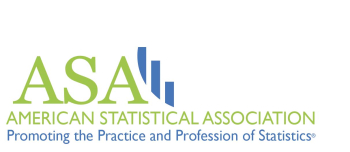Speakers
Ellen Galantucci (Federal Maritime Commission)
"Safeguarding Confidentiality in Federal Statistics: Navigating AI Challenges"
Emily Hadley (RTI International)
"Practical Approaches for Ensuring the Responsible Use of AI"
Benjamin Reist (NORC)
"Addressing Algorithm Bias/Fairness in AI Systems"
Kristi Boyd (SAS)
"Ethical AI in Government: Recognizing bias across the data and AI lifecycle"
Moderator
Lisa Mirel (NSF)
Agenda
 Ellen Galantucci
Ellen Galantucci
Safeguarding Confidentiality in Federal Statistics: Navigating AI Challenges
Abstract: As advancements in AI continue to reshape the landscape of data analysis, the assurance of confidentiality within federal statistics becomes increasingly complex. This presentation delves into the critical considerations surrounding confidentiality when employing AI methodologies in statistical endeavors. From leveraging ChatGPT to exploring broader machine learning techniques, I examine the inherent risks and strategies for reducing the likelihood of confidentiality breaches. By elucidating the complexities and offering practical insights, this talk aims to empower statisticians and policymakers in safeguarding sensitive information while harnessing the potential of AI in federal statistical practices.
 Emily Hadley
Emily Hadley
Practical Approaches for Ensuring the Responsible Use of AI
Abstract: AI and data science offer tremendous promise for federal government use, but also potential for great harm. In this talk, we will provide an overview of the ethical challenges in AI and data science and responsible approaches to mitigate these concerns. These practical methods include AI use policies and procedures, algorithm review boards, and audits and assessments. We conclude with discussion of ongoing responsible AI policy developments.
 Benjamin Reist
Benjamin Reist
Addressing Algorithm Bias/Fairness in AI Systems
Abstract: Since the early days of use of computer automation issues of fairness have been raised and many examples of bias have been documented. As AI becomes more widely used, understanding the potential for bias in the algorithms of these models has become increasingly important. Mitigation and monitoring of AI and their applications are important responsibilities of the organizations that develop and implement them. As Federal Agencies implement AI into operations it is important that a robust strategy for measuring and mitigating algorithm bias to ensure fairness in AI. We will discuss some of the challenges for instituting such a strategy.
 Kristi Boyd
Kristi Boyd
Ethical AI in Government: Recognizing bias across the data and AI lifecycle
As the use of AI in government continues to grow, it is essential to address the ethical context. This presentation will frame the discussion around the data and AI lifecycle as seen in a number of government use cases. We will consider the role of ethics when managing data, developing models, and deploying insights, and discuss the importance of addressing bias and privacy within the AI lifecycle. We will also examine the risks of codifying historic biases through automation and propose a framework for AI governance with a focus privacy and ethics.
About the Speakers
 Ellen Galantucci is a senior data scientist at the Federal Maritime Commission. Ellen’s work at the FMC focuses on modernizing data analysis methods, data collection, and developing policies for publishing data. Prior to working at the FMC, Ellen worked as a research mathematical statistician at the Bureau of Labor Statistics, focusing on disclosure limitation, machine learning, and data linkage. Ellen has undergraduate degrees in Political Science and Psychology from Eastern Michigan University. She has a MA and Ph.D. in Political Science from the University of North Carolina-Chapel Hill with a focus on American Politics and Research Methods.
Ellen Galantucci is a senior data scientist at the Federal Maritime Commission. Ellen’s work at the FMC focuses on modernizing data analysis methods, data collection, and developing policies for publishing data. Prior to working at the FMC, Ellen worked as a research mathematical statistician at the Bureau of Labor Statistics, focusing on disclosure limitation, machine learning, and data linkage. Ellen has undergraduate degrees in Political Science and Psychology from Eastern Michigan University. She has a MA and Ph.D. in Political Science from the University of North Carolina-Chapel Hill with a focus on American Politics and Research Methods.
 Emily Hadley is a Research Data Scientist with RTI International, an independent nonprofit research institute dedicated to improving the human condition. In her work, Emily collaborates with subject matter experts to solve complex problems in health, education, and justice using data science and statistical methods. Emily’s main research interests are exploring technical and policy approaches to addressing bias, equity, and ethics in data science.
Emily Hadley is a Research Data Scientist with RTI International, an independent nonprofit research institute dedicated to improving the human condition. In her work, Emily collaborates with subject matter experts to solve complex problems in health, education, and justice using data science and statistical methods. Emily’s main research interests are exploring technical and policy approaches to addressing bias, equity, and ethics in data science.
 Benjamin Reist is a principal statistician in the Statistics & Data Science department for NORC at the University of Chicago. He has over 15 years of statistical consulting experience in the areas of sample design, model-assisted estimation, survival analysis, adaptive survey design, variance estimation, analysis of complex survey data, experimental design, missing data, paradata, quality metrics, data governance, and disclosure avoidance. Ben oversees statistical operations for two large scale federal surveys - the High School and Beyond Follow-up Survey (HS&B) and the Survey of Doctoral Recipients (SDR). His work on these surveys includes implementation of adaptive survey design techniques, sampling, weighting, and variance estimation. Prior to joining NORC, Ben spent over 15 years in Federal Service. While in Federal Service, he worked at NASA, the National Agricultural Statistics Service (NASS), and the U.S. Census Bureau. He was the Deputy Chief Data Officer for NASA and the Deputy Director for Science and Planning at NASS. At the Census Bureau, he held numerous positions, including Survey Director and Lead Scientist for the National Survey of College Graduates (NSCG) and Assistant Center Chief in the Center for Adaptive Design.
Benjamin Reist is a principal statistician in the Statistics & Data Science department for NORC at the University of Chicago. He has over 15 years of statistical consulting experience in the areas of sample design, model-assisted estimation, survival analysis, adaptive survey design, variance estimation, analysis of complex survey data, experimental design, missing data, paradata, quality metrics, data governance, and disclosure avoidance. Ben oversees statistical operations for two large scale federal surveys - the High School and Beyond Follow-up Survey (HS&B) and the Survey of Doctoral Recipients (SDR). His work on these surveys includes implementation of adaptive survey design techniques, sampling, weighting, and variance estimation. Prior to joining NORC, Ben spent over 15 years in Federal Service. While in Federal Service, he worked at NASA, the National Agricultural Statistics Service (NASS), and the U.S. Census Bureau. He was the Deputy Chief Data Officer for NASA and the Deputy Director for Science and Planning at NASS. At the Census Bureau, he held numerous positions, including Survey Director and Lead Scientist for the National Survey of College Graduates (NSCG) and Assistant Center Chief in the Center for Adaptive Design.
 Kristi Boyd is the Trustworthy AI Specialist at SAS, supporting the company's responsible innovation and Trustworthy AI strategy. Kristi's expertise as an AI Ethicist is enhanced by her International Business and Technology Ethics degrees, CIPT certification, and experience in QA & Product Management. She speaks regularly on AI Ethics and Governance and has contributed to publications through Duke Graduate School, IAPP, EqualAI, ACAMS Today, COSMOS Compliance, and SAS.com.
Kristi Boyd is the Trustworthy AI Specialist at SAS, supporting the company's responsible innovation and Trustworthy AI strategy. Kristi's expertise as an AI Ethicist is enhanced by her International Business and Technology Ethics degrees, CIPT certification, and experience in QA & Product Management. She speaks regularly on AI Ethics and Governance and has contributed to publications through Duke Graduate School, IAPP, EqualAI, ACAMS Today, COSMOS Compliance, and SAS.com.
About the Moderator
 Lisa Mirel is the Statistical Advisor at the National Center for Science and Engineering Statistics (NCSES) within the U.S. National Science Foundation. In this role Ms. Mirel serves as NCSES’s senior technical statistical advisor and supports Center priorities related to survey design, statistical standards, privacy and confidentiality, data quality, and demonstration projects for a future National Secure Data Service. Prior to coming to NCSES, she served as the Chief of the Data Linkage Methodology and Analysis Branch at the National Center for Health Statistics (NCHS), Centers for Disease Control and Prevention. In that role, she directed the NCHS Data Linkage program, leading Agency efforts to integrate NCHS data collection systems with external sources of health-related administrative data.
Lisa Mirel is the Statistical Advisor at the National Center for Science and Engineering Statistics (NCSES) within the U.S. National Science Foundation. In this role Ms. Mirel serves as NCSES’s senior technical statistical advisor and supports Center priorities related to survey design, statistical standards, privacy and confidentiality, data quality, and demonstration projects for a future National Secure Data Service. Prior to coming to NCSES, she served as the Chief of the Data Linkage Methodology and Analysis Branch at the National Center for Health Statistics (NCHS), Centers for Disease Control and Prevention. In that role, she directed the NCHS Data Linkage program, leading Agency efforts to integrate NCHS data collection systems with external sources of health-related administrative data.
About the NISS/FCSM AI in Federal Government Series
The National Institute of Statistical Sciences (NISS) and the Federal Committee on Statistical Methodology (FCSM) are collaborating on a series of webinars on Artificial Intelligence (AI). The initial webinar took place on October 31, 2023 on AI in Federal Government: Uses, Potential Applications, and Issues. This series aims to benefit federal practitioners and managers by providing behind-the-scenes information on uses of AI in federal agencies and from insights on how agencies meet organizational, managerial, and ethical challenges in harnessing the power of AI. Participation by researchers and managers in the webinars can help streamline current efforts to adopt AI and inspire new endeavors. The NISS/FCSM webinar series creates unique opportunities not easily available through other forums or venues. Thank you to the American Statistical Association (ASA) for becoming a sponsor of the series.
Event Type
- NISS Hosted
- NISS Sponsored
Host
Sponsor
Cost
Website
Location
Policy




